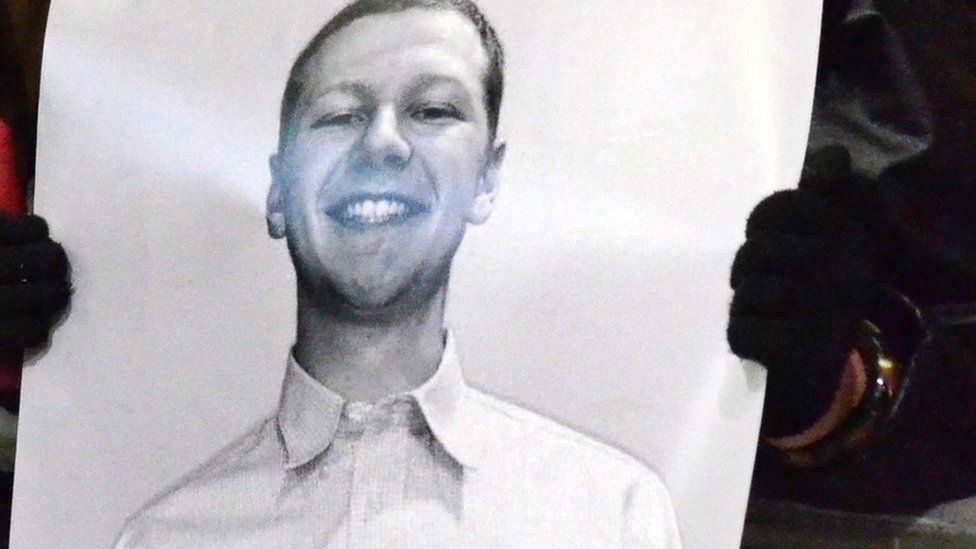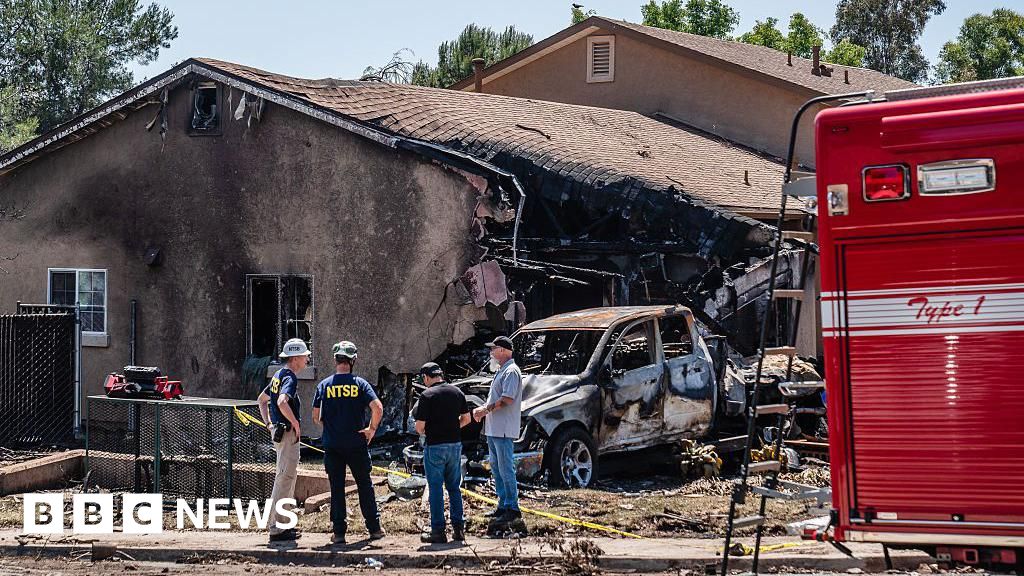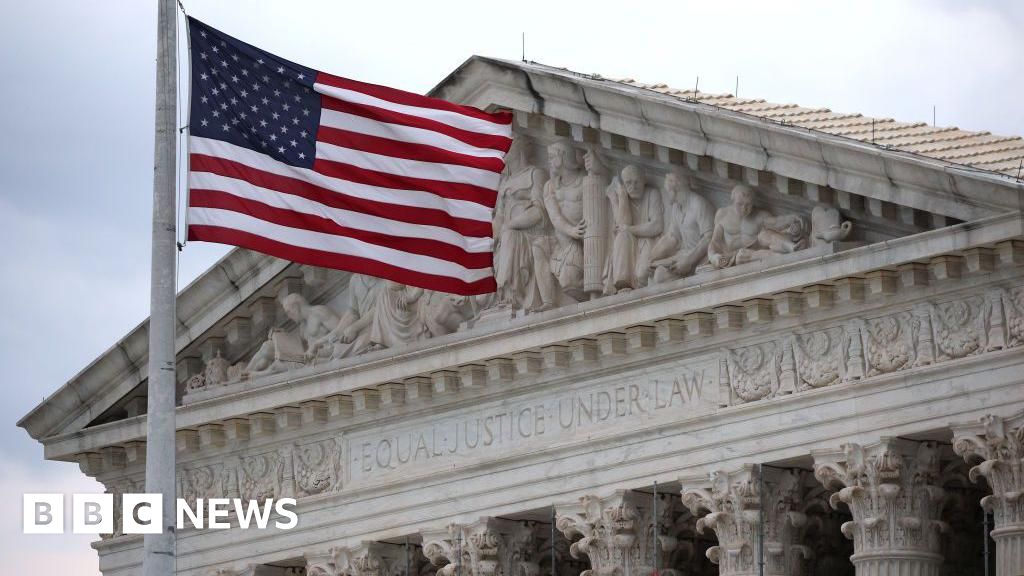ARTICLE AD BOX
 Image source, Anadolu
Image source, Anadolu
A protester in Chicago holds a photo of Aaron Bushnell
By Kayla Epstein in New York and Angelica Casas in San Antonio
BBC News
On Sunday morning, 25-year-old Aaron Bushnell walked calmly up to the Israeli Embassy in Washington, DC and set himself on fire.
Dressed in his US Air Force uniform, Mr Bushnell said he would "no longer be complicit in genocide". He shouted "Free Palestine" as he burned, until he collapsed to the ground. Hours later, he died in hospital.
Mr Bushnell live-streamed his self-immolation, ensuring that his actions - which he described as an "extreme act of protest" - were seen far beyond Washington.
Though his initial video was removed, the footage was shared widely on social media, and Mr Bushnell's suicide has prompted vigils in US cities this week by those campaigning against Israel's military actions in Gaza. The death toll there passed 30,000 this week, according to the Hamas-run health ministry.
Others have expressed concern about the extreme nature of his protest and fears it could inspire other deadly acts.
But for Mr Bushnell's friends, his death has hit much closer to home. His self-immolation took even those closest to him completely by surprise and they have found themselves caught between the weight of grieving a friend and processing what he did, while also dealing with the sudden spotlight from the world's media.
Those who knew him in San Antonio, Texas, where Mr Bushnell lived from 2020 to late last year while stationed at Lackland Air Force base, said his death had rippled through a community of organisers and activists like a "shockwave".
"Initially, there was just a lot of shock and sadness, that he felt this was the only action that he could do to bring attention to something that he cared heavily about," Mason Escamilla, who knew Mr Bushnell, told the BBC on Friday before a public vigil held in a San Antonio Park.
"It's hard that he chose these actions, it's hard to comprehend even from people who sympathise with a ceasefire and the safety of Palestinian people and civilians," Mr Escamilla, 25, said.
At least 200 people attended the vigil, including many local Palestinians. One by one, Mr Bushnell's friends took to the microphone to remember and mourn him.
Mason Escamilla lights a candle at a San Antonio vigil for Aaron Bushnell
Before Sunday, Mr Escamila said he knew Mr Bushnell as "normal, quiet, friendly, quirky guy," who drank root beer, embraced leftist politics, and volunteered with groups who helped people experiencing homelessness. The airman had a cat named Sugar and liked the Lord of the Rings, he said.
Moon, a friend of Mr Bushnell's who asked to be identified only by his first name, met him through volunteer work and described him as "incredibly strong willed". The video of his final moments, he said, "was very tough to see."
Sara Masoud, a 32-year-old Palestinian organiser who attended the vigil, said learning the news of his death "was really devastating."
But the shocking act has prompted discussion among activists who feel "a sense of relatability to the futility that drove his action", she said.
- If you've been affected by the issues in this story, help and support is available via the BBC Action Line. In the United States, support is available by dialling 988 Lifeline.
Mr Bushnell had described himself as an anarchist, once writing that he "believed in the abolition of all hierarchal power structures" through legal means.
While based in San Antonio with the Air Force, he was also active in number of community and mutual aid groups and gravitated especially towards helping the homeless, his friends said.
In initial volunteer outings, delivering supplies like first aid and clothing, Mr Bushnell was "a little shy", Mr Escamilla recalled, but said he soon learned to engage closely with the people he helped.
Mr Escamilla believed Mr Bushnell felt a tension between his military service and his political beliefs.
He was still in the military when the Israel-Gaza war erupted in October last year. Some 1,200 people were killed after Hamas gunmen attacked communities in southern Israel. They took around 250 hostages back into the Gaza Strip, with many still alive and being held there.
About 1.8 million Palestinians have been displaced since Israel launched retaliatory military action, which it says is aimed at destroying Hamas.
Moon, a friend of Aaron Bushnell's, speaks at the San Antonio vigil
While Mr Bushnell had strong pro-Palestinian views and engaged with local activist groups, no-one expected that he would end his life in a protest against the war in Gaza.
An unusual journey
Aaron Bushnell grew up in Orleans, Massachusetts, in a tightly cloistered religious community known as the Community of Jesus, according to his friends.
A childhood friend, Ashley Schuman, told the New York Times he had told her he left the community in 2019. Mr Escamilla said that Mr Bushnell was no longer involved in the Community of Jesus and had distanced himself from his family.
Some former members of the Community of Jesus alleged psychological abuse in a 2021 ABC News investigation.
Mr Bushnell's parents, the Community of Jesus, and a former employer in the community declined to comment to the BBC.
In his youth, Mr Bushnell belonged to a competitive performance group called Spirit Winter Percussion. A group photo from six years ago on his Facebook page shows the young performers wearing colourful uniforms and large grins.
Image source, Friends of Aaron Bushnell
Image caption,Aaron Bushnell and his cat, Sugar, in an undated photo provided to the BBC by his friends.
"Back then he didn't really talk about much besides sports, music, etc," Brian Spencer, who was in the percussion group with Mr Bushnell, told the BBC. "But he was a good dude and would always lend a helping hand when needed."
Mr Bushnell entered active service on 5 May, 2020, according the Air Force. His most recent role was in cyber defence operations.
Friends say he left San Antonio late last year, and he was living in Ohio before his death. On his LinkedIn page, Mr Bushnell wrote he was seeking opportunities in the US military's SkillBridge program, which allows military personnel to transition into civilian jobs after their service ends.
He was still in the Air Force at the time of his death.
"We extend our deepest sympathies to the family and friends of Senior Airman Bushnell," US Air Force Col. Celina Noyes said in a statement.
At Friday's vigil, there was an emphasis on remembering the airman as his friends knew him and the causes he believed in, rather than how the world had come to learn his name.
Before she began her speech on Friday, a woman who volunteered with Mr Bushnell told the crowd: "You're going to hear a lot of sad things. But you're also going to hear a lot of really good things.
"Because this final, fiery moment was not the sum of his life."

 1 year ago
35
1 year ago
35








 English (US) ·
English (US) ·